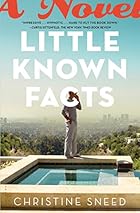Christine SneedInterview
Author of Little Known Facts: A Novel
Author Interview
 Christine Sneed teaches creative writing for Northwestern University's graduate writing program and for Pacific University's MFA program. Her stories have been published in many literary journals, and her book of short stories, Portraits of a Few of the People I've Made Cry, was awarded a 2010 Los Angeles Times book prize. Christine's first novel, Little Known Facts, will be published in early February by Bloomsbury.
Christine Sneed teaches creative writing for Northwestern University's graduate writing program and for Pacific University's MFA program. Her stories have been published in many literary journals, and her book of short stories, Portraits of a Few of the People I've Made Cry, was awarded a 2010 Los Angeles Times book prize. Christine's first novel, Little Known Facts, will be published in early February by Bloomsbury.
For those who haven't yet had a chance to read it, give us the nutshell version of Little Known Facts, if you would.
This is a character-driven novel about a family in Hollywood; the person at the book's center is a successful film actor whose two adult children are struggling to step out from the large shadow he casts over their lives.
Do you recall what first gave you the idea to write a novel about Hollywood fame and its effects on both the famous person and those around him?
I remember wondering one day what it would be like to have a famous film actor as your father, especially if you are a young man—what sort of competition and envy would you feel? This is where the idea for the book began, but I'm not sure what triggered it.
You've written that Little Known Facts asks of its characters 'If you could have anything in the world, what would you choose?' How would you answer that question yourself?
Well, it will sound a little suspect, but it's nonetheless true: I would help friends and family pay debts, send their children to college, take fancy vacations in the sun. I'd want to be able to take fancy, sunny vacations too and spend more time in France, the country where I studied in college; it remains very close to my heart. I'd also like to see about four movies a week.
 The first chapter of the novel was originally published as a standalone short story, I understand? Can you tell us a bit about the process of expanding that original story into a full book?
The first chapter of the novel was originally published as a standalone short story, I understand? Can you tell us a bit about the process of expanding that original story into a full book?
I wrote "Relations," the first chapter, in the fall of 2010, and in mid-March 2011, I realized that I was still very curious about Will, his father, his sister Anna, etc. and started to sketch out subsequent chapters. They seemed real to me, despite the rarefied plane on which they lived.
Tell us a bit about your writing process: how and when do you do much of your writing? Any particular hints or tips on writing that you'd like to share?
I usually write in the afternoons when I'm not teaching; I do sometimes write at night, but not as often. The writing advice I often give is that you can get a lot done in the interstices—even if you only have 30-45 minutes on a given day, sit down and at least make some notes. A book is written little by little, not in one marathon session.
Who are some of the authors you find yourself returning to again and again?
John Updike, Alice Munro, Floyd Skloot, Deborah Eisenberg, Rosellen Brown, Edward P. Jones, Stuart Dybek, Jack Driscoll, Bonnie Jo Campbell, Steve Almond, Penelope Fitzgerald. I love their work. There are a lot of authors I love—I know we don't have space for them all!
What's your own library like? What sorts of books would be found on your shelves?
Some poetry but mostly fiction and nonfiction by American and British writers, and currently on my desk are Dan Chaon's Stay Awake, Jess Walter's Beautiful Ruins, Achy Obejas's Ruins, along with Brad Watson's Aliens in Their Prime, also, Outrageously Offensive Jokes III and The PEN/O. Henry Prize Stories 2012.
What books have you read and enjoyed recently?
Adam McOmber's The White Forest, Elissa Schappell's Blueprints for Building Better Girls, Jess Walter's Beautiful Ruins, Rosellen Brown's Cora Fry's Pillow Book and Debra Gwartney's Live Through This.
Can you tell us about your next project?
I'm working on a new manuscript about a female psychologist who is experiencing both professional and personal turmoil, but I'm trying to maintain a comic tone.
—interview by Jeremy Dibbell
